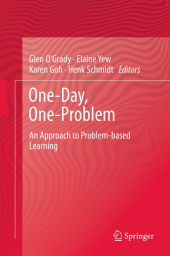 Neuerscheinungen 2014Stand: 2020-02-01 |
Schnellsuche
ISBN/Stichwort/Autor
|
Herderstra▀e 10
10625 Berlin
Tel.: 030 315 714 16
Fax 030 315 714 14
info@buchspektrum.de |

Karen P.L. Goh, Glen O┤Grady, Henk Schmidt, Elaine Yew
(Beteiligte)
One-Day, One-Problem
An Approach to Problem-based Learning
Herausgegeben von O┤Grady, Glen; Yew, Elaine; Goh, Karen P.L.; Schmidt, Henk
2012. 2014. viii, 300 S. 18 Tabellen. 235 mm
Verlag/Jahr: SPRINGER, BERLIN; SPRINGER SINGAPORE; SPRINGER 2014
ISBN: 9814560944 (9814560944)
Neue ISBN: 978-9814560948 (9789814560948)
Preis und Lieferzeit: Bitte klicken
This essential case study shows how PBL can be reinvented across disciplines, explaining an adaptation of the technique, pioneered at the Republic Polytechnic of Singapore, where students attain learning outcomes through solving curriculum-related problems.
One-day, one-problem is a unique adaptation of problem-based learning (PBL) pioneered at Republic Polytechnic, Singapore. Here students are challenged each day with a problem from their domain and attain the necessary learning outcomes in the process of responding to the problem. Throughout the day students would engage in small group discussions, self-directed learning and conversations with their teacher who plays the role of a facilitator. This approach to learning and instruction represents a new brand of constructivist learning in a more structured learning environment compared to conventional PBL. This book contains a series of chapters by authors with first-hand experience in the One-day,one-problem PBL approach. Unlike other books on PBL, the chapters are both research-informed and practical. Results of empirical studies into the factors of PBL such as quality of problems, tutor behaviours, scaffoldings, student learning and interest are discussed together with practical implications for the educator.
The book begins with an overview of the one-day, one-problem process, providing a viewpoint from both the student and tutor. Republic Polytechnic┤s pedagogical philosophy and epistemological belief of education are introduced with the intent to share how the polytechnic designed and implemented a system that supports the philosophical beliefs. Results and practical implications of empirical studies on the various factors that influence students┤ learning in PBL are discussed. These include the quality of problems and the use of scaffoldings for students┤ learning, tutors as facilitators, preparation of staff for PBL, student assessment, how students learn in the process of PBL and student interest.
Introduction and overview.- Preface.- Chapter 1: One-day, one-problem at Republic Polytechnic.- Chapter 2: A brief history of problem-based learning.- Chapter 3: Pedagogical philosophy underpinning one-day, one-problem.- Student learning.- Chapter 4: The process of student learning in one-day, one-problem.- Chapter 5: Problem-based learning and student motivation: the role of interest in learning and achievement.- Chapter 6: The student perspective: How students manage their learning at Republic Polytechnic.- Problems and scaffolds.- Chapter 7: Characteristics of effective problems.- Chapter 8: Scaffolding in problem-based learning.- Assessment.- Chapter 9: Holistic assessment and problem-based learning.- Chapter 10: Assessing student learning: Daily self-assessment at Republic Polytechnic.- Facilitators.- Chapter 11: Teachers as facilitators.- Chapter 12: A staff education and development programme to support PBL.- Conclusion.- Chapter 13: Summary and conclusions.


